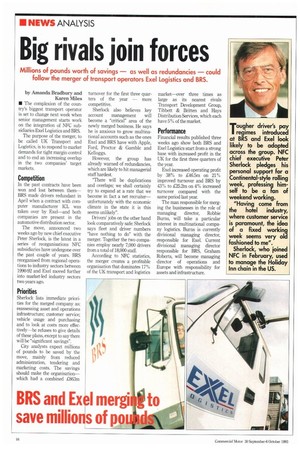Big rivals join forces
Page 18

If you've noticed an error in this article please click here to report it so we can fix it.
by Amanda Bradbury and Karen Miles
• The complexion of the country's biggest transport operator is set to change next week when senior management starts work on the integration of NFC subsidiaries Exel Logistics and BRS.
The purpose of the merger, to be called UK Transport and Logistics, is to respond to market demands for tight margin control and to end an increasing overlap in the two companies' target markets.
Competition
In the past contracts have been won and lost between themBRS made drivers redundant in April when a contract with computer manufacturer ICL was taken over by Exel—and both companies are present in the automotive distribution sector.
The move, announced two weeks ago by new chief executive Peter Sherlock, is the latest in a series of reorganisations NFC subsidiaries have undergone over the past couple of years. BRS reorganised from regional operations to industry sectors between 1990-92 and Exel moved further into market-led industry sectors two years ago.
Priorities
Sherlock lists immediate priorities for the merged company as: reassessing asset and operations infrastructure; customer service; vehicle usage and purchasing and to look at costs more effectively—he refuses to give details of these plans, except to say there will be "significant savings".
City analysts expect millions of pounds to be saved by the move, mainly from reduced administration, tendering and marketing costs. The savings should make the organisation— which had a combined £863m turnover for the first three quarters of the year — more competitive.
Sherlock also believes key account management will become a "critical" area of the newly merged business. He says he is anxious to grow multinational accounts such as the ones Exel and BRS have with Apple, Ford, Proctor & Gamble and Kelloggs.
However, the group has already warned of redundancies, which are likely to hit managerial staff hardest "There will be duplications and overlaps; we shall certainly try to expand at a rate that we become in fact a net recruiter— unfortunately with the economic climate in the state it is this seems unlikely".
Drivers' jobs on the other hand look comparatively safe: Sherlock says fleet and driver numbers "have nothing to do" with the merger. Together the two companies employ nearly 7,000 drivers from a total of 18,000 staff.
According to NFC statistics, the merger creates a profitable organisation that dominates 17% of the UK transport and logistics market—over three times as large as its nearest rivals Transport Development Group, Tibbett & Britten and Hays Distribution Services, which each have 5% of the market.
Performance
Financial results published three weeks ago show both BRS and Exel Logistics start from a strong base with increased profit in the UK for the first three quarters of the year.
Exel increased operating profit by 38% to £46.5m on 21% improved turnover and BRS by 43% to £252m on 4% increased turnover compared with the same period last year.
The man responsible for merging the businesses in the role of managing director, Robbie Burns, will take a particular interest in multinational company logistics. Burns is currently divisional managing director, responsible for Exel. Current divisional managing director responsible for BRS, Graham Roberts, will become managing director of operations and Europe with responsibility for assets and infrastructure.
























































































